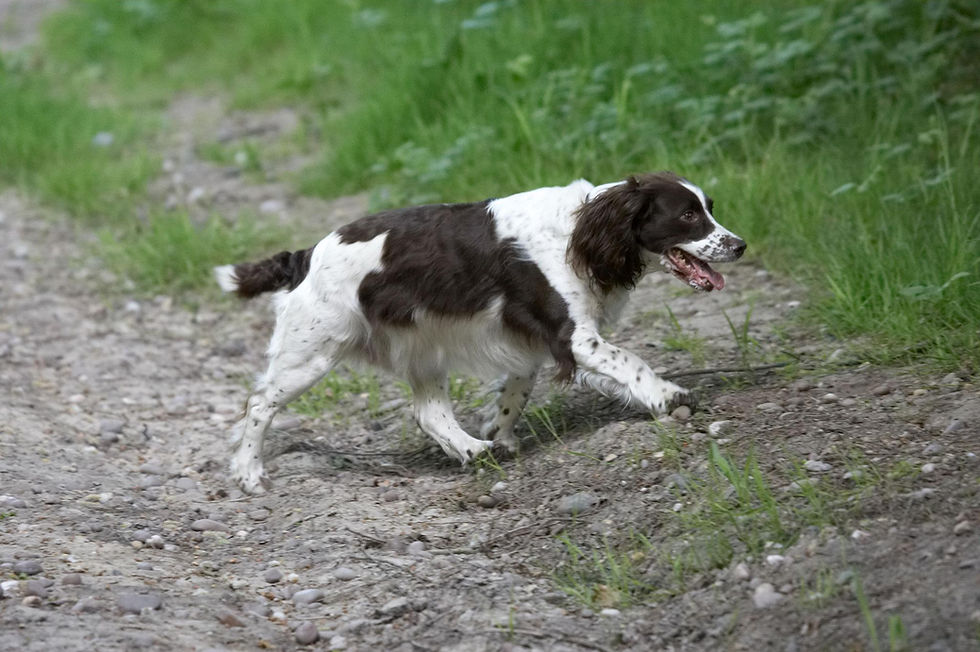How many words can a dog learn?
- Avril Munson

- Jul 4, 2022
- 4 min read

Can dogs understand English?
Most people talk to their dogs, when a dog lives with us for many years they can learn a lot of words, especially the important ones to them such as: walkies, dinner time, do you want to go out….. the mistake most owners make is believing dogs will understand english language from the very beginning, this leads to frustration for puppy and owner.
“As for language, the average dog can learn 165 words, including signals,” said Stanley Coren, PhD, of the University of British Columbia
Notice that Coren lists signals as language. I would be interested to know the dogs ages when they hit the 165 and how many were in fact words plus body language, just how many purely words? Most dogs understand “sit” yet how many sit when the person is in different positions, maybe standing, sitting, have their back to the dog etc.
The method of communication that dogs respond to well is movement and actions. From the day the puppy comes into our homes they are watching us closely, they are acutely aware of everything we do. Dogs are not worrying about paying the mortgage or the electricity bill, they simply spend most of their waking hours watching us, they very soon start to anticipate what we will do next almost before we know, we are constantly giving them clues through our behaviour. For example that putting on certain shoes precedes a dog walk, another pair of shoes can mean they are staying home. If we want to speed up the process of the dog learning words, be consistent in putting a word clearly to the action every time, only saying the word or phrase once, for example “do you want to go out?” followed by opening the door, dogs will learn eventually to run to the door if you ask the question. Repetition of words or phrases leads to confusion as the dog may believe he got the answer wrong and try another move.
“Stopping a behaviour is very different to training a behaviour”
Owners often confuse the two!

Take jumping up, one of the most common dog behaviours that people request help to stop, jumping up only becomes an issue because of how we inherently behave in response.
Generally people will react to jumping up in one or some of the following ways:
Eye contact - they look at the dog
Hands outstretched - and either touching the dog or the movement alone can be interpreted as a play gesture
Turn or move away - the dog learns to shepherd you around
Speak or shout - either way talking to the dog
Pet the dog - some owners like their dog jumping up, at least some of the time
Bend over and stroke the dog in an attempt to calm the dog - now the dog will be completely convinced the human likes him to jump up
Any or all of the above used at various times
All of these responses will ensure the dog keeps jumping up, yet the owner keeps doing the same stuff in the hope it will one day work, whilst becoming more and more frustrated.
If you truly wish to stop this behaviour?
And many owners truly don't - they may think they do but their behaviour says differently!
Firstly stop responding in the above ways!
Second you choose to either teach the dog what you do want instead?
For example: Sit, down, go to bed
Or if you are committed to stop the behaviour:
The response that will stop the jumping up most effectively is to completely blank the dog and walk through them, yes through, not round or away from them but through. By keeping your feet close to the ground you can avoid stepping on them or kicking them, but very determinedly walk through them and repeat consistently and as often as necessary!

I am often asked which is the cleverest dog?
Taken from the web site of the American Psychological Association:
Data from 208 dog obedience judges from the United States and Canada showed the differences in working and obedience intelligence of dog breeds, according to Coren. “Border collies are number one; poodles are second, followed by German shepherds. Fourth on the list is golden retrievers; fifth, dobermans; sixth, Shetland sheepdogs; and finally, Labrador retrievers”
However, a smart dog with poor training will still struggle to learn any task. A dog’s ability to learn human language ultimately depends on their owner’s ability to teach them efficiently.
My true belief is that I would base intelligence on how well a dog does the required job, for example I am a number one fan of the Border Collie, yet this is not the best breed to make a family pet, suddenly the Border Collie can look bad at a job. If I want a guard dog my list would be very different, or a hunting dog, or a search and find dog. A truly Intelligent dog will only reach its full potential when it is the right dog in the right job or right home.




Comments